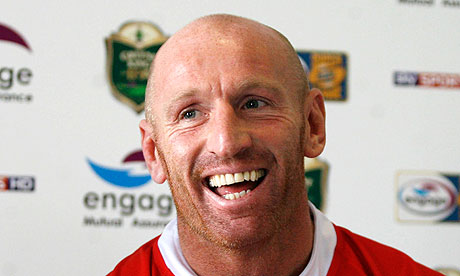
In his final game for Wales, Gareth Thomas became their first rugby union international to reach 100 caps, an epic World Cup match against Fiji in Nantes during 2007. But it was his decision some two years later to announce to the world he is gay, so breaking a taboo in a macho sport, that brought him to the attention of the wider world.
Thomas said back in 2009 that he did not want to be known as a gay rugby player. "I am a rugby player and first and foremost I am a man," he said. In the event that decision hardly caused a stir in South Wales, where his sexuality was an open secret, and the international referee Nigel Owens had also come out, but it was a pretty brave decision at the time and one of many incidents in one of Welsh rugby's most colourful life stories.
Thomas on Tuesday made another announcement – that he is leaving rugby for good. It was less earth-shattering, given that he is now 37 years old and his rugby league club, the Crusaders, are no longer a Super League club. But he had been expected to join Wigan next season and, in the shorter term, play for Wales in theforthcoming Four Nations tournament, starting against England this weekend. Thomas, who has returned home after a stint as an ITV analyst during the rugby union World Cup, had met up with his new Wales team-mates and left them perplexed by telling them he will not be available for the tournament for "personal reasons".
If nothing else the drama of the past 48 hours will provide the method actor Mickey Rourke, who is portraying the life of Thomas in a new film, with some handy extra material.
Thomas had been an ever-present last autumn in the European Cup campaign, when Wales earned their place in the Four Nations tournament which also features Australia and New Zealand. He had been a modest success in rugby league. He made 13 appearances for the Crusaders in the first year after switching codes and 18 in the last season, when he also broke an arm playing against Hull KR.
Thomas's declaration that he is gay caused less of a sensation than when the three-quarter, then playing for Bridgend, was found guilty of a nightclub assault in 2002 by a court in Pau in south-west France. He was fined the equivalent of £1,000. That blemish did not prevent Thomas from joining Toulouse, with whom he won a Heineken Cup winners' medal in 2005.
Thomas was also involved in a row over player-power in the Welsh camp that led to the resignation of the then-coach Mike Ruddock in February 2006. Thomas had a heated disagreement with the Observer rugby correspondent Eddie Butler on television over the affair. He fell ill while watching a recording of the interview and was rushed to hospital with a suspected stroke that was diagnosed as a ruptured artery in his neck.
He played on, though, and captained Wales in his final Six Nations game against England, after Stephen Jones pulled out of the game with a wrist injury.
Born in Sarn, Bridgend, Thomas was a back who spent most of his rugby union career with Cardiff. After making his Test debut against Japan in 1995, he went on to captain his nation; Jones was eventually to pass that record 100 caps. He made three appearances on the 2005 British & Irish Lions tour to New Zealand and was appointed captain for the second and third Tests following an injury to Brian O'Driscoll.
Thomas's life was never humdrum. Even when he scored a try in that 100th game against Fiji, Wales managed to lose 38-34 in a stunning game that meant they were dumped out of the World Cup – the coach Gareth Jenkins was sacked the next day.
The rugby world will miss "Alfie" and that familiar head-patting routine he underwent after scoring one of his many tries.
Even in his unexpected departure he showed himself to be a singular man, and one of Wales's most talented players of recent times.

